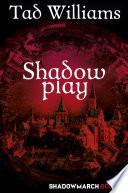Works
Memory, Sorrow, and Thorn
Tad WilliamsFamous Tad Williams Quotes
Source: Memory, Sorrow, and Thorn, The Dragonbone Chair (1988), Chapter 42, “Beneath the Uduntree” (p. 718).
Context: “Never make your home in a place,” the old man had said, too lazy in the spring warmth to do more than wag a finger. “Make a home for yourself inside your own head. You’ll find what you need to furnish it—memory, friends you can trust, love of learning, and other such things.” Morgenes had grinned. “That way it will go with you wherever you journey. You’ll never lack for a home—unless you lose your head, of course...”
“She had to find her own story, and she could make it whatever shape she thought best.”
Source: River of Blue Fire
Tad Williams Quotes about God
“Sometimes doing the gods’ bidding required a hardened heart.”
Source: Memory, Sorrow, and Thorn, To Green Angel Tower (1993), Part 1, Chapter 4, “The Silent Child” (p. 145).
Source: Memory, Sorrow, and Thorn, To Green Angel Tower (1993), Part 1, Chapter 6, “The Sea-Grave” (p. 185).
Source: Memory, Sorrow, and Thorn, The Dragonbone Chair (1988), Chapter 34, “Forgotten Swords” (p. 567).
Source: Memory, Sorrow, and Thorn, To Green Angel Tower (1993), Part 1, Chapter 21, “Answered Prayers” (p. 649).
Source: Memory, Sorrow, and Thorn, The Dragonbone Chair (1988), Chapter 16, “The White Arrow” (p. 238).
Source: Memory, Sorrow, and Thorn, To Green Angel Tower (1993), Part 1, Chapter 13, “The Nest Builders” (p. 405).
Tad Williams Quotes about thinking
Source: Memory, Sorrow, and Thorn, To Green Angel Tower (1993), Part 2, Chapter 13, “The Fallen Sun” (p. 314).
Source: Memory, Sorrow, and Thorn, The Dragonbone Chair (1988), Chapter 42, “Beneath the Uduntree” (p. 724).
Morgenes leaned forward, waggling the leather-bound volume under Simon’s nose. “A piece of writing is a trap,” he said cheerily, “and the best kind. A book, you see, is the only kind of trap that keeps its captive—which is knowledge—alive forever. The more books you have,” the doctor waved an all-encompassing hand about the room, “the more traps, then the better chance of capturing some particular, elusive, shining beast—one that might otherwise die unseen.”
Source: Memory, Sorrow, and Thorn, The Dragonbone Chair (1988), Chapter 7, “The Conqueror Star” (pp. 92-93).
Source: Memory, Sorrow, and Thorn, Stone of Farewell (1990), Chapter 9, “Cold and Curses” (p. 207).
“It was easy to hate if he did not think, Simon discovered.”
Source: Memory, Sorrow, and Thorn, To Green Angel Tower (1993), Part 1, Chapter 15, “Lake of Glass” (p. 469).
“Part of manhood, I am thinking, is to ponder one’s words before opening one’s mouth.”
Source: Memory, Sorrow, and Thorn, Stone of Farewell (1990), Chapter 12, “Birdsflight” (p. 297).
Tad Williams: Trending quotes
Author’s Warning
Source: Memory, Sorrow, and Thorn, The Dragonbone Chair (1988)
Tad Williams Quotes
“… Coca-Cola and fries, the wafer and wine of the Western religion of commerce.”
Source: City of Golden Shadow
“Fear goes where it is invited.”
Source: Memory, Sorrow, and Thorn, Stone of Farewell (1990), Chapter 7, “Spreading Fires” (p. 171).
Source: Memory, Sorrow, and Thorn, The Dragonbone Chair (1988), Chapter 31, “The Councils of the Prince” (p. 502).
“Nothing is without cost. There is a price to all power, and it is not always obvious.”
Source: Memory, Sorrow, and Thorn, The Dragonbone Chair (1988), Chapter 10, “King Hemlock” (p. 142).
Source: Memory, Sorrow, and Thorn, To Green Angel Tower (1993), Part 1, Chapter 13, “The Nest Builders” (p. 406).
“We trolls say: “Make Philosophy your evening guest, but do not let her stay the night.””
Source: Memory, Sorrow, and Thorn, The Dragonbone Chair (1988), Chapter 17, “Binabik” (p. 260).
Source: Memory, Sorrow, and Thorn, To Green Angel Tower (1993), Part 1, Chapter 12, “Raven’s Dance” (p. 392).
“There are no promises in life, Sludig, but it seems to me smarter to take fewer chances.”
Source: Memory, Sorrow, and Thorn, Stone of Farewell (1990), Chapter 25, “Petals in a Wind Storm” (p. 640).
Source: Memory, Sorrow, and Thorn, Stone of Farewell (1990), Chapter 9, “Cold and Curses” (p. 211).
Source: Memory, Sorrow, and Thorn, The Dragonbone Chair (1988), Chapter 37, “Jiriki’s Hunt” (p. 619).
“Light, with its handmaiden color, was everywhere.”
Source: Memory, Sorrow, and Thorn, The Dragonbone Chair (1988), Chapter 37, “Jiriki’s Hunt” (p. 629).
Source: Memory, Sorrow, and Thorn, Stone of Farewell (1990), Chapter 14, “A Crown of Fire” (p. 342).
Source: Memory, Sorrow, and Thorn, To Green Angel Tower (1993), Part 1, Chapter 17, “Bonfire Night” (p. 540).
“A king’s son has nothing but inferiors, each one a potential assassin.”
Source: Memory, Sorrow, and Thorn, The Dragonbone Chair (1988), Chapter 1, “The Grasshopper and the King” (p. 12).
Source: Memory, Sorrow, and Thorn, Stone of Farewell (1990), Chapter 2, “Masks and Shadows” (p. 37).
Source: Memory, Sorrow, and Thorn, The Dragonbone Chair (1988), Chapter 18, “A Net of Stars” (p. 262).
Source: Memory, Sorrow, and Thorn, To Green Angel Tower (1993), Part 1, Chapter 20, “Travelers and Messengers” (p. 639).
Source: Memory, Sorrow, and Thorn, To Green Angel Tower (1993), Part 2, Chapter 6, “The Circle Narrows” (p. 150).
“There was nothing he could do unless he accepted what was real.”
Source: Memory, Sorrow, and Thorn, To Green Angel Tower (1993), Part 2, Chapter 24, “The Graylands” (p. 544).
“Perhaps he was a bumpkin; at least he was an honest bumpkin.”
Source: Memory, Sorrow, and Thorn, The Dragonbone Chair (1988), Chapter 32, “Northern Tidings” (p. 516).
“Simple answers to life’s questioning. That would be a magic beyond any I have ever been seeing.”
Source: Memory, Sorrow, and Thorn, Stone of Farewell (1990), Chapter 8, “On Sikkihoq’s Back” (p. 188).
Source: Memory, Sorrow, and Thorn, The Dragonbone Chair (1988), Chapter 12, “Six Silver Sparrows” (p. 177).
“Things are not always as old songs tell them to be—especially when it is concerning dragons.”
Source: Memory, Sorrow, and Thorn, Stone of Farewell (1990), Chapter 8, “On Sikkihoq’s Back” (p. 176).
Source: Memory, Sorrow, and Thorn, The Dragonbone Chair (1988), Chapter 20, “The Shadow of the Wheel” (p. 302).
Source: Memory, Sorrow, and Thorn, Stone of Farewell (1990), Chapter 9, “Cold and Curses” (p. 237).
“The last thing a drunkard loses, you see, is his cunning: it outlasts his soul by a long season.”
Source: Memory, Sorrow, and Thorn, To Green Angel Tower (1993), Part 1, Chapter 9, “Pages in an Old Book” (p. 301).
Source: Memory, Sorrow, and Thorn, To Green Angel Tower (1993), Part 2, Chapter 24, “The Graylands” (p. 540).
Source: Memory, Sorrow, and Thorn, To Green Angel Tower (1993), Part 1, Chapter 8, “Nights of Fire” (p. 255).
“Ambitious men never believe others aren’t the same.”
Source: Memory, Sorrow, and Thorn, The Dragonbone Chair (1988), Chapter 30, “A Thousand Nails” (p. 484).
Source: Memory, Sorrow, and Thorn, The Dragonbone Chair (1988), Chapter 17, “Binabik” (p. 253).
“In times of badness, gold is being worth more than beauty.”
Source: Memory, Sorrow, and Thorn, To Green Angel Tower (1993), Part 2, Chapter 15, “A Meandering of Ink” (p. 357).
“No charm is proof against a dagger in the back.”
Source: Memory, Sorrow, and Thorn, The Dragonbone Chair (1988), Chapter 40, “The Green Tent” (p. 677).
Source: Memory, Sorrow, and Thorn, Stone of Farewell (1990), Chapter 25, “Petals in a Wind Storm” (pp. 626-627).
Source: Memory, Sorrow, and Thorn, The Dragonbone Chair (1988), Chapter 41, “Cold Fire and Grudging Stone” (p. 713).
Source: Memory, Sorrow, and Thorn, Stone of Farewell (1990), Chapter 23, “Deep Waters” (p. 591).
Source: Memory, Sorrow, and Thorn, The Dragonbone Chair (1988), Chapter 10, “King Hemlock” (p. 139).
The count leaned forward. “Knowledge.”
Source: Memory, Sorrow, and Thorn, To Green Angel Tower (1993), Part 2, Chapter 21, “The Frightened Ones” (p. 491).
Source: Memory, Sorrow, and Thorn, The Dragonbone Chair (1988), Chapter 43, “The Harrowing” (p. 739).
Source: Memory, Sorrow, and Thorn, To Green Angel Tower (1993), Part 1, Chapter 2, “Chains of Many Kinds” (p. 71).
Source: Memory, Sorrow, and Thorn, To Green Angel Tower (1993), Part 1, Chapter 20, “Travelers and Messengers” (p. 636).
Source: Memory, Sorrow, and Thorn, To Green Angel Tower (1993), Part 1, Chapter 20, “Travelers and Messengers” (p. 635).
Source: Memory, Sorrow, and Thorn, Stone of Farewell (1990), Chapter 28, “Sparks” (p. 707).
Source: Memory, Sorrow, and Thorn, To Green Angel Tower (1993), Part 1, Chapter 12, “Raven’s Dance” (pp. 392-393).
“If you have not noticed, we are preparing for war. I’m sorry if that inconveniences you.”
Source: Memory, Sorrow, and Thorn, The Dragonbone Chair (1988), Chapter 34, “Forgotten Swords” (p. 549).
Source: Memory, Sorrow, and Thorn, The Dragonbone Chair (1988), Chapter 31, “The Councils of the Prince” (p. 500).
Source: Memory, Sorrow, and Thorn, To Green Angel Tower (1993), Part 2, Chapter 13, “The Fallen Sun” (p. 307).
“I shall endeavor to turn dross to purest Metal Absolute: in short, to teach you something.”
Source: Memory, Sorrow, and Thorn, The Dragonbone Chair (1988), Chapter 4, “Cricket Cage” (p. 41).
Source: Memory, Sorrow, and Thorn, The Dragonbone Chair (1988), Chapter 28, “Drums of Ice” (p. 447).
Source: Memory, Sorrow, and Thorn, The Dragonbone Chair (1988), Chapter 13, “Between Worlds” (p. 199).



